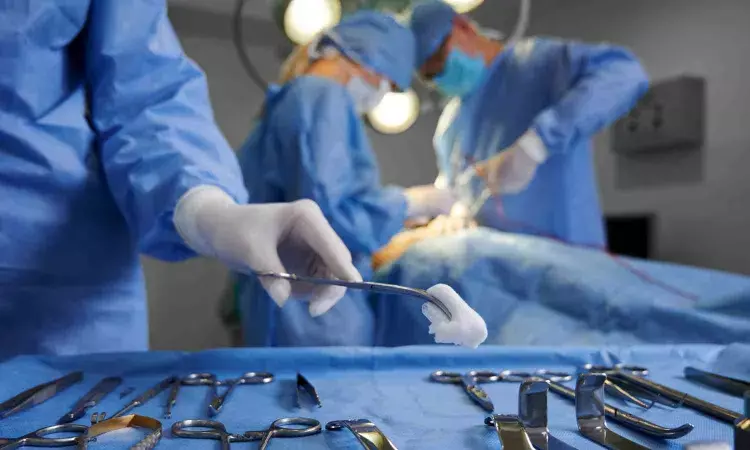- Home
- Medical news & Guidelines
- Anesthesiology
- Cardiology and CTVS
- Critical Care
- Dentistry
- Dermatology
- Diabetes and Endocrinology
- ENT
- Gastroenterology
- Medicine
- Nephrology
- Neurology
- Obstretics-Gynaecology
- Oncology
- Ophthalmology
- Orthopaedics
- Pediatrics-Neonatology
- Psychiatry
- Pulmonology
- Radiology
- Surgery
- Urology
- Laboratory Medicine
- Diet
- Nursing
- Paramedical
- Physiotherapy
- Health news
- Fact Check
- Bone Health Fact Check
- Brain Health Fact Check
- Cancer Related Fact Check
- Child Care Fact Check
- Dental and oral health fact check
- Diabetes and metabolic health fact check
- Diet and Nutrition Fact Check
- Eye and ENT Care Fact Check
- Fitness fact check
- Gut health fact check
- Heart health fact check
- Kidney health fact check
- Medical education fact check
- Men's health fact check
- Respiratory fact check
- Skin and hair care fact check
- Vaccine and Immunization fact check
- Women's health fact check
- AYUSH
- State News
- Andaman and Nicobar Islands
- Andhra Pradesh
- Arunachal Pradesh
- Assam
- Bihar
- Chandigarh
- Chattisgarh
- Dadra and Nagar Haveli
- Daman and Diu
- Delhi
- Goa
- Gujarat
- Haryana
- Himachal Pradesh
- Jammu & Kashmir
- Jharkhand
- Karnataka
- Kerala
- Ladakh
- Lakshadweep
- Madhya Pradesh
- Maharashtra
- Manipur
- Meghalaya
- Mizoram
- Nagaland
- Odisha
- Puducherry
- Punjab
- Rajasthan
- Sikkim
- Tamil Nadu
- Telangana
- Tripura
- Uttar Pradesh
- Uttrakhand
- West Bengal
- Medical Education
- Industry
High BMI risk factor for adverse outcomes after autologous breast reconstruction: Study

USA: A recent study has shown a great potential of preoperative weight loss to alleviate surgical risk in obese and overweight patients pursuing autologous breast reconstruction.
The results, published in Plastic and Reconstructive Surgery, quantify the risk reduction based on a patient's preoperative body mass index (BMI).
For women undergoing autologous breast reconstruction-reconstruction using the patient's own tissues, rather than implants – the risks of overall and specific complications are increased at higher BMI levels, the study stated.
"Our study clarifies the impact of high BMI as a risk factor for adverse outcomes of autologous breast reconstruction," comments senior author Merisa Piper, MD, of University of California, San Francisco. "It also suggests that, among patients with obesity, losing weight before surgery might lower the risk of complications."
How does BMI affect autologous breast reconstruction outcomes?
Autologous breast reconstruction, typically using a flap of tissue from the abdomen, is an alternative for reconstruction after mastectomy for breast cancer. Autologous reconstruction offers advantages including stable breast reconstruction with fewer surgical procedures, in less time, and at lower cost, compared to implant-based reconstruction.
However, not all patients are optimal candidates for this procedure: risk factors for adverse outcomes include smoking, uncontrolled diabetes, and high BMI. Despite previous studies, the impact of high BMI on outcomes of autologous breast reconstruction remain unclear.
Dr. Piper and colleagues analyzed the impact of BMI on outcomes of autologous reconstruction in 365 patients (545 breasts) between 2004 and 2021. All patients underwent microvascular breast reconstruction using an abdominal-based flap. Complications were assessed for patients in different BMI categories, ranging from normal weight (less than 25 kg/m2), to overweight (25 to 29.9 kg/m2), to obese (30 kg/m2 or higher).
Complication risks affected at different BMI cutoffs
Several types of complications increased at distinct levels of BMI, especially in the obese range. The risk of any complication increased at a BMI of 30 kg/m2 or higher. More severe obesity-BMI 35 kg/m2 or higher-was associated with increased rates of unplanned repeat surgery, including wound breakdown requiring reoperation.
Risk of infection requiring oral antibiotics increased at BMI 25 kg/m2 or higher, while infections requiring intravenous antibiotics increased at BMI 30 kg/m2 or higher. Higher BMI levels were also associated with increased rates of complications related to the abdominal donor flap, including infection and wound-healing problems.
Further analyses suggested optimal BMI cutoff point of 32.7 kg/m2 to minimize the occurrence of any breast complication and 30.0 kg/m2 for any abdominal complication. With a BMI of 32.7 kg/m2, the risk of breast complications was similar to that associated with current smoking.
The study demonstrates "a robust trend" whereby higher BMI levels are associated with increased complication rates for women undergoing autologous breast reconstruction. The findings suggest that targeting specific levels of weight loss before surgery might help to avoid postoperative complications.
"By quantifying the change in risk profile associated with a given change in BMI, our results can be used clinically to set evidence-based preoperative weight-loss goals for patients," Dr. Piper and coauthors conclude. They emphasize that further studies would be needed to specifically evaluate the effects of weight loss before surgery.
Reference:
Barnes LL, Lem M, Patterson A, Segal R, Holland MC, Lentz R, Sbitany H, Piper M. Relationship between Body Mass Index and Outcomes in Microvascular Abdominally Based Autologous Breast Reconstruction. Plast Reconstr Surg. 2024 Mar 1;153(3):553-566. doi: 10.1097/PRS.0000000000010621.
Dr Kamal Kant Kohli-MBBS, DTCD- a chest specialist with more than 30 years of practice and a flair for writing clinical articles, Dr Kamal Kant Kohli joined Medical Dialogues as a Chief Editor of Medical News. Besides writing articles, as an editor, he proofreads and verifies all the medical content published on Medical Dialogues including those coming from journals, studies,medical conferences,guidelines etc. Email: drkohli@medicaldialogues.in. Contact no. 011-43720751


